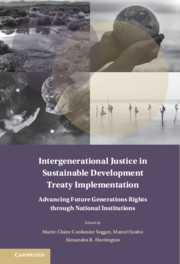 Intergenerational Justice in Sustainable Development Treaty Implementation
Intergenerational Justice in Sustainable Development Treaty Implementation Book contents
- Intergenerational Justice in Sustainable Development Treaty Implementation
- Treaty Implementation for Sustainable Development
- Intergenerational Justice in Sustainable Development Treaty Implementation
- Copyright page
- Contents
- Figures
- Tables
- Notes on Contributors
- Foreword
- Acknowledgements
- Abbreviations and Acronyms
- 1 Introduction
- 2 The Theoretical Framework for International Legal Principles of Intergenerational Equity and Implementation through National Institutions
- Part I Introduction to Treaty Law on Intergenerational Justice and Codifying Sustainability
- Part II Key Challenges in Domestic Implementation of Intergenerational Justice
- Part III Law and Policy Innovations for Intergenerational Justice
- Part IV Implementing Sustainability through National Institutions: Case Studies
- Part V Regional Trends in Intergenerational Justice
- Part VI Future Trends
- 36 Equity across Generations in Implementing International Law on Water
- 37 Intergenerational Justice in the Paris Agreement on Climate Change
- 38 The Four-Branches Model of Government: Representing Future Generations
- 39 Intergenerational Equity in Sustainable Development Treaty Implementation
- Afterword
- Table of Authorities
37 - Intergenerational Justice in the Paris Agreement on Climate Change
from Part VI - Future Trends
Published online by Cambridge University Press: 15 October 2021
- Intergenerational Justice in Sustainable Development Treaty Implementation
- Treaty Implementation for Sustainable Development
- Intergenerational Justice in Sustainable Development Treaty Implementation
- Copyright page
- Contents
- Figures
- Tables
- Notes on Contributors
- Foreword
- Acknowledgements
- Abbreviations and Acronyms
- 1 Introduction
- 2 The Theoretical Framework for International Legal Principles of Intergenerational Equity and Implementation through National Institutions
- Part I Introduction to Treaty Law on Intergenerational Justice and Codifying Sustainability
- Part II Key Challenges in Domestic Implementation of Intergenerational Justice
- Part III Law and Policy Innovations for Intergenerational Justice
- Part IV Implementing Sustainability through National Institutions: Case Studies
- Part V Regional Trends in Intergenerational Justice
- Part VI Future Trends
- 36 Equity across Generations in Implementing International Law on Water
- 37 Intergenerational Justice in the Paris Agreement on Climate Change
- 38 The Four-Branches Model of Government: Representing Future Generations
- 39 Intergenerational Equity in Sustainable Development Treaty Implementation
- Afterword
- Table of Authorities
Summary
Climate change is a crucial challenge for both intragenerational and intergenerational equity, offering the world an unprecedented opportunity to demonstrate its commitment to the principles and practice of sustainable development. In 2016, through Transforming Our World: The 2030 Agenda for Sustainable Development, the UN and its member States agreed on seventeen SDGs for the world, identifying time-bound targets and implementation methods. As legal reviews have revealed, the targets adopted in the SDGs are not just aspirational goals and objectives, as many can also be found in the object and purpose of many important international treaties among states. Achieving SDG 13 to take urgent action to combat climate change and its impacts will be implemented in part through the 2015 Paris Agreement. Indeed, in SDG 13, States acknowledge that the 1992 UNFCCC and its instruments are the primary international, intergovernmental forum for negotiating the global response to climate change. Other SDGs, for instance on energy, water, hunger, poverty, biodiversity, oceans, cities, and infrastructure, are also highly relevant to climate change, including SDG 10 to reduce inequality within and among countries and, as such, offer crucial opportunities to either frustrate or foster intergenerational equity and justice.
- Type
- Chapter
- Information
- Intergenerational Justice in Sustainable Development Treaty ImplementationAdvancing Future Generations Rights through National Institutions, pp. 731 - 753Publisher: Cambridge University PressPrint publication year: 2021


